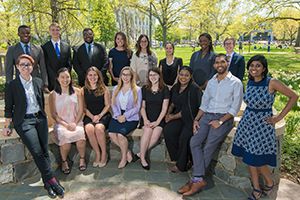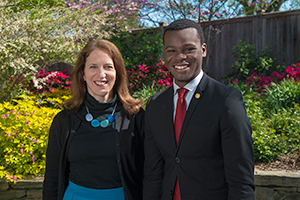You are here: American University Commencement 2018 SIS Spring 2018 Commencement Ceremony
School of International Service 2018 Spring Commencement Ceremony
Dean's Address
School of International Service Interim Dean Christine Chin speaks at 2018 Spring Commencement.
Undergraduate Speaker Address
Angela Pupino, undergraduate speaker, makes her remarks to her SIS classmates at 2018 Spring Commencement.
Angela Pupino (Remarks as Prepared)
Good afternoon and welcome to the graduates, faculty, and esteemed guests of graduates at the American University School of International Service.
For the last four years, I have described myself as an SIS major to anyone who asked. But as I reflected on what these last four years have taught me, I realized how casually I have tossed around the name of my school. After all, words matter. We are not graduates of the American University “School of International Relations”. We are not graduates of the “School of International Affairs”, nor “Diplomacy”, nor “International Studies”. Instead, we are graduates of the American University School of International Service. Today I want to focus on that service.
As the first person in my family to go to college, I know that I did not get here alone. My success is the product of my parents, who supported me even though they wished I would have stayed closer to home. My success is the product of my grandmother and aunt, who took off work and cancelled plans for every campus move-in day. My success is the product of the congregation at my church in Ohio, who passed around the offering plate to raise money for my semester abroad in London. My graduation day only comes because of the people that served me: the teachers that taught me inside and outside of the classroom, the communities that rallied around me, and all the mentors and internship supervisors who were willing to take a chance on me. I dedicate my college degree to those who served me, those who taught me the value of sincerity and integrity, and those who showed me that service is about giving back everything you have been given.
Douglas Adams, the author of The Hitchhiker’s Guide to the Galaxy, once said that, “To give real service you must add something which cannot be bought or measured with money, and that is sincerity and integrity.” Those are both traits that are sorely needed, internationally and domestically, whether in government, the private sector, or in the vibrant mosaic of charities, NGOs, schools, and social movements that are shaping our world. The world needs sincere and honest public servants, willing to step into the world’s most difficult, dangerous, and disheartening situations, identify what’s needed, and make recommendations. And the world needs a new generation of humble and honest policymakers, educators, and journalists, who will seek to understand before asking to be understood.
Our generation is being called to serve a world that is troubled. From growing global inequality to nuclear proliferation to the impacts of climate change, the problems before us are complex and constantly evolving, and they often seem endless. In order to tackle these problems, we must all be dedicated to service.
Every time I walk into the School of International Service building, I am reminded that service is not a moment: it’s a mindset. Class of 2018, we have made service our mindset for the last four years. We have spent countless hours serving our communities and innumerable organizations on campus, in Washington DC, and around the world. We understand how our knowledge, passion, and talents can be used to serve others. As we move into the next stages of our lives, we must arm ourselves with sincerity and integrity. We must go out and serve our world. And no matter where we end up after we walk across this stage today, we must never forget that we are graduates of the American University School of International Service.
Graduate Speaker Address
Agnes Sagina, graduate speaker, makes her remarks at SIS Spring 2018 Commencement.
Agnes Sagina (Remarks as Prepared)
Yá'át'ééh shik'èí dóó shidine'è.
Welcome distinguished guests, faculty, family, friends and everyone who has taken the time to celebrate the achievements of SIS’s Class of two thousand and eighteen.
I’m sure most of you know this, but public service is difficult. And yet here we stand today, ready to serve. So I want to know – what inspires you?
I grew up on the Navajo reservation. It’s like you imagine: small, rural, peaceful, and it has the most incredible view of the stars. People are kind and intelligent. We celebrate women within our matriarchal culture and though we’re humble, one of our greatest prides is the Code Talkers.
The Code Talkers were a group of young men who created a code based on the Navajo Language during WWII that defied interception and decryption. No one doubts that they’re heroes.
Yet as I grew up, their story didn’t seem so simple. Yes, their service inspired me, but it didn’t make sense to me, especially as I learned about Diné history; the broken treaties - the Long Walk - the camp at Hwéeldi.
And yet, when Japanese and German forces threatened the United States, instead of focusing on these wrongs, they filled recruiting offices.
They said “Send me, send me.”
Growing up, I wanted to stay in my community and serve as a lawyer. But, one day in High School, I saw a Navajo Marine looking sharp in her Blue Dress uniform. She stood tall and proud. I saw her strength and remembered the courage of the Code Talkers. Their service inspired me so I told the Marine recruiter to “Send me.”
I was eager to serve, but at the same time, part of me was filled with guilt. I felt like I was betraying my tribe or somehow leaving them behind. But I told myself I was still serving them, just in a different way. Plus, I’d be back someday.
I wore the uniform that had inspired me at a variety of overseas duty stations. But one day the uniform made me a little sad. My group visited an orphanage in Thailand, and although the kids eventually warmed up, they were initially scared because of the uniform.
My uniform meant something different to them, than to me. I didn’t want them to be scared, I wanted them to understand I was there to help.
I couldn’t get this moment out of my mind. Why were they scared? I needed a better understanding.
Once again, I had conflicted feelings, but ultimately I made the difficult decision to leave the Marine Corps and enroll at the School of International Service.
To say coming here was a culture shock is an understatement. I was intimidated, shy, and insecure. SIS forced me to reexamine my experiences.
For example, while I was stationed as a Marine in Okinawa, there were regular protests. At the time I couldn’t understand why they were protesting. My class on East Asia helped me see their struggle on a personal level. I recognized their loss of sovereignty, and realized the US military presence on Okinawa was part of the problem. The complexity of serving opened before my eyes.
How can we serve when we cannot even see the challenges around us?
How can we serve and be confident in our service when it can be hard to know whether we are helping or part of the problem?
Or how could I have served in Thailand as a Marine for over a year without realizing that Thailand is a hotbed for human trafficking? As I learned more at SIS, I felt a pang of guilt that is still with me today. If I had only known.
SIS gave me the ability to recognize problems and to understand that their complexity doesn’t make them easier to solve but it does give us a place to start.
My professors and peers pushed me to take a more expansive view of the world - one that is more open, more critical and dare I say more optimistic about the value of international service.
And I hope I’m not alone in feeling like this. Alone in feeling like I’m not doing enough. Alone in feeling like I’ve left people behind who needed me.
But most of all, most of all, I hope I’m not alone in feeling optimistic.
Service is hard. But here we can take a lesson from the courage of the Code Talkers. Their story inspires us to serve. It reminds us to serve in the face of complexity, to serve in the face of historical wrongs, to serve in the face of imperfect institutions.
The world needed the Code Talkers and it still needs Navajo voices. The world needs diversity to generate new and creative ideas. It needs empathy and open ears, bold and compassionate leadership, and above all a resolute commitment to solving the problems that can be solved, redressing the wrongs that can be redressed, and healing the wounds that have been handed down from generation to generation.
So, my fellow graduates, think about what inspires you. Think about what inspires you and then say “Send Me.”
Ahéhee'. Thank you.
Commencement Speaker Address
Leymah Gbowee delivered the SIS Commencement Address for Spring 2018 graduates on May 12 in Bender Arena.
Commencement Speaker
Leymah Gbowee
Liberian Peace Activist & Women's Rights Advocate
Receiving an honorary Doctor of International Affairs degree
2011 Nobel Peace Laureate Leymah Gbowee is a Liberian peace activist, social worker and women's rights advocate. She is Founder and President of the Gbowee Peace Foundation Africa, based in Monrovia.
Leymah is best known for leading a nonviolent movement that brought together Christian and Muslim women to play a pivotal role in ending Liberia's devastating, fourteen-year civil war in 2003. This historic achievement paved the way for the election of Africa's first female head of state, Liberian President Ellen Johnson Sirleaf. It also marked the vanguard of a new wave of women emerging worldwide as essential and uniquely effective participants in brokering lasting peace and security.
Leymah's story as told in the 2008 documentary film Pray the Devil Back to Hell and her 2011 memoir, Mighty Be Our Powers - as well as her lectures and discussions with groups large and small - have engaged, inspired and motivated untold numbers of people worldwide.
In February 2012, Leymah Gbowee launched a new nonprofit organization, the Gbowee Peace Foundation Africa (GPFA), in Monrovia, Liberia, which provides educational and leadership development opportunities for women, girls and youth. She serves on the Board of Directors of the Nobel Women's Initiative, Gbowee Peace Foundation and the PeaceJam Foundation, and she is a member of the African Women Leaders Network for Reproductive Health and Family Planning.
She holds a M.A. in Conflict Transformation from Eastern Mennonite University (Harrisonburg, VA). She has received several honorary degrees.


